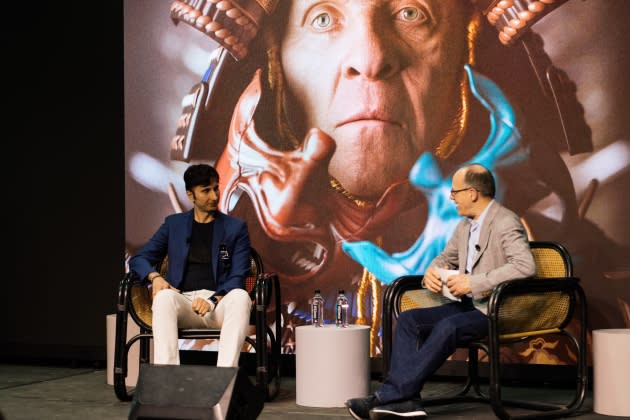SXSW Wear House: Orange Comet Details the Metaverse Tipping Point

Experiential Web3 production and promotion company Orange Comet doesn’t view the metaverse as a destination.
“It’s not a format or a place or a platform that you’re waiting for that’s gonna be built,” said cofounder and chief creative officer Dante Ferrarini. He sat down with WWD editorial director James Fallon in Austin, Texas, during SXSW at the Wear House activation, presented by WWD, Footwear News and Beauty Inc.
More from WWD
“It is really a time. And what I mean by that is that once people understand or believe that their digital assets have actual value — and I don’t mean people that believe in Web3 and people that are collectors in this space, I mean everyday people,” he added. “When my mother believes that her digital artwork or content is as valuable as anything she owns in the real space, that’s the time. That’s the tipping point.”
He compared ballooning attention on Web3 to the dot-com boom: it’s inevitable.
“We know that’s going to proceed. What we don’t know is how collectibles play a part in it. They’re a very simple component on [the blockchain]; they are a token. They are the gateway. They are sort of the amuse-bouche, the appetizer,” he said. “As far as the metaverse goes, I think that we are early on with that. We are developing formats, we are still figuring out the technologies.”
One hurdle to Web3 ubiquity is the education aspect: not everyone understands smart contracts, how to buy crypto or has a Web3 wallet. “We are taking a long-term view and onboarding people by educating, by also making this technology transparent,” Ferrarini said. “I don’t want people to have to think about how to do things. You don’t go to the ATM and try to figure out what the heck is going on. You just go there, put your card and get your money. So we want this to work the same way: seamless and transparent.”
As for brands that approach Web3 by creating replicas of existing physical products, Ferrarini thinks that strategy isn’t likely to move the needle far enough to have lasting impact. “It’s going to have a moment and work, but at the end of the day it doesn’t offer the brand a lot of value,” he said. “For us, creating wearables that live in the metaverse means creating something unique and different.”
Orange Comet has created NFT collections with Anthony Hopkins and Scottie Pippen, and is unveiling an engine-based game with “The Walking Dead” and AMC later this month during the Game Developers Conference.
“The collaborations that we do are strictly true partnerships. We do not license content,” Ferrarini said. “We think it’s riskier and harder to create real partnerships, because that demands due diligence from both sides.” When meeting with potential collaborators, Orange Comet prioritizes showing them how their IP can be reinvented and boosted through a Web3-centric approach.
“Even though we are deeply rooted in technology, we believe in creative first and foremost. We are storytellers,” Ferrarini said. “So we are creating original content and extending it into this new avenue, building and extending communities, as opposed to simply saying, how do we help you take your IP and put it on the blockchain?”
Ferrarini and chief executive officer Dave Broome have known each other for more than 20 years, and worked together on several different projects before starting Orange Comet. Broome brings his experience as a Hollywood producer, while as a designer Ferrarini has a strong background in 3D animation and art.
“[Broome] is the visionary between the creative side and the mission of Orange Comet being what we are, a Web3 entertainment and gaming company,” Ferrarini said.
“We had developed such a strong friendship over the past 20 years that when when all of this Web3 stuff rose up in the past few years, we decided to look into the space,” he added. “We saw these amazing artists doing incredible things. Where we saw the void was companies that were trying to do branded IPs, companies that were trying to execute on projects that were putting out cinematic properties, episodic series, brand products – they were kind of not really hitting the mark. We saw a void and we wanted to fill that.”
Best of WWD
